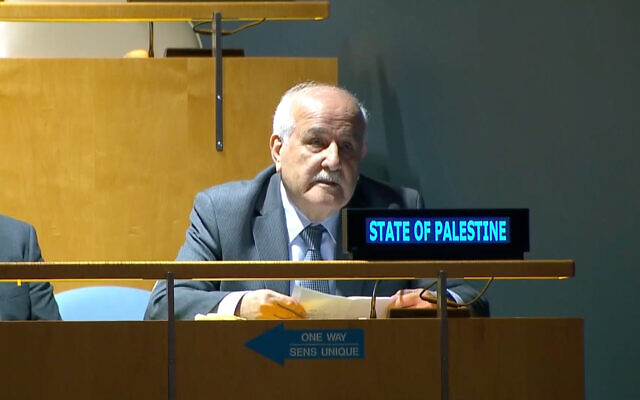The United Nations General Assembly approved on Friday a resolution requesting the International Court of Justice weigh in on the Israeli-Palestinian conflict, Israeli “annexation” and the “legal status of the occupation.”
The resolution promoted by the Palestinians passed by a vote of 87 in favor, 26 against, with 53 abstentions.
In favour: 87, including Portugal, China, Russia, Iran and the three countries involved in the "Qatargate" scandal: Qatar, Morocco and Mauritania.
Against: 26, including the US, Canada, Germany, UK, Italy, Hungary, Romania, Austria and Australia.
Abstention: 53, including India, Brazil, Japan, Belarus, North Korea, France, Spain, Netherlands and Sweden.
The resolution is titled “Israeli practices and settlement activities affecting the rights of the Palestinian people and other Arabs of the occupied territories” and calls on the Hague-based ICJ to “render urgently an advisory opinion” on Israel’s “prolonged occupation, settlement and annexation of Palestinian territory.”
It also calls for an investigation into Israeli measures “aimed at altering the demographic composition, character and status of the Holy City of Jerusalem” and says Israel has adopted “discriminatory legislation and measures.”
The resolution demands the court weigh in on the conflict in accordance with international law and the UN charter.
The ICJ, also known as the world court, is the top UN court for mediating disputes between countries. Its rulings are binding and influence public opinion but it has no mechanism for enforcement. The court is separate from the International Criminal Court, which is also in The Hague.
The court last issued an advisory opinion on the Israeli-Palestinian conflict in 2004 when the General Assembly asked it to rule on the legality of the separation barrier.
Israel, the US, the UK, Australia, Austria, Canada, Germany and Italy voted against Friday’s resolution.
China, Iran, Ireland, Poland, Portugal, Russia and Saudi Arabia were among those voting in favor, along with Muslim or Arab states with which Israel has relations including Egypt, Jordan, Morocco, the United Arab Emirates, Bahrain, Sudan and Azerbaijan.
France, Brazil, Denmark, Finland, Japan, the Netherlands, Sweden and Switzerland abstained.
The votes against the resolution and abstentions together amounted to 79 countries, meaning there was a smaller margin of support than usual for an anti-Israel measure at the General Assembly.

Some members of the 193-nation assembly, including Ukraine, did not cast a vote. Kyiv’s support for the resolution in a committee earlier this year sparked a diplomatic spat between Ukraine and Israel.
The UN has a long history of passing resolutions against Israel, and Israel and the US accuse it of bias. Israel has accused the Palestinians, who have nonmember observer state status at the UN, of trying to use the world body to circumvent peace negotiations and impose a settlement.
Earlier Friday, Israeli ambassador to the UN Gilad Erdan denounced the UN for the resolution, calling it a “moral stain” on the world body. He has argued that the vote delegitimizes and demonizes Israel, including by referring to the Temple Mount only by its Arabic name, Haram al-Sharif.
The Temple Mount is the holiest place for Jews as the site of the ancient temples, and the third holiest site in Islam as the location of the Al-Aqsa Mosque.
Erdan did not appear at the vote because it took place after the start of Shabbat. A US representative voted against the resolution on behalf of Israel.
“No international body can decide that the Jewish people are ‘occupiers’ in their own homeland. Any decision from a judicial body which receives its mandate from the morally bankrupt and politicized UN is completely illegitimate,” Erdan said in a Friday statement. “The Palestinians have rejected every peace initiative while supporting and inciting terror. Instead of pushing the Palestinians to change, the UN is doing the opposite: helping them to harm the only vibrant democracy in the Middle East.”
“The decision to hold a vote that deals with Israel on Shabbat is another example of the moral decay of the UN, which prevents Israel’s position from being heard in a vote whose results are predetermined,” he said.
Erdan had his term as UN envoy extended by Prime Minister Benjamin Netanyahu on Thursday in one of his first moves after returning to the premier’s office.
The Palestinian representative to the UN, Riyad Mansour, applauded the resolution after it passed.
“This vote comes one day after the new Israeli government was formed pledging to accelerate colonial and racist policies against the Palestinian people,” Mansour told the General Assembly.
“We trust that, regardless of your vote today, if you believe in international law and peace you will uphold the opinion of the International Court of Justice when delivered and you will stand up to this Israeli government right now because freedom, justice and peace shall prevail,” he said.
Anne Bayefsky, a pro-Israel human rights lawyer and professor who monitors the UN, said Mansour’s comments immediately after the vote, before consideration of the facts or law, indicated the probe’s result was likely preordained.
“It’s not law at all. It’s a political stunt,” she said. “He is 100% certain the result will go his way. The General Assembly has made a mockery of the court.”
The Jerusalem-based NGO Monitor said the vote “represents another stage in the political war against Israel, based on the cynical use of UN and international legal bodies.”
Ahead of the General Assembly vote, the resolution calling for ICJ guidance passed in the UN’s Fourth Committee last month by a vote of 98 in favor, 17 opposed and 52 abstentions.
Israel has blasted the resolution as biased and dismissive of Israeli security concerns. Former prime minister Yair Lapid waged a diplomatic campaign, contacting over 50 world leaders, to muster opposition to the move.
Israel’s new hardline government, sworn in on Thursday, is likely to further stoke tensions with the UN and the international community. The UN secretary-general’s office and the UN Human Rights Council did not respond to a request for comment on the new government and its policies toward the Palestinians.
The UN envoy to the Middle East peace process, Tor Wennesland, congratulated Netanyahu on Thursday, said he will continue to work with the Israeli government, and stressed the UN’s commitment to a two-state solution.
Of Netanyahu’s coalition partners, none are on record supporting a two-state solution with the Palestinians, some support annexing the West Bank without granting equal rights to Palestinians in those areas, and many also vehemently oppose coordination or strengthening the PA.
Netanyahu’s government is expected to entrench Israel’s control over the West Bank. His coalition deals included a vague commitment to annex the territory to Israel, a pledge to legalize dozens of unauthorized settlements, and the provision of large funds for road building and public transport in the West Bank.
“The Jewish people have an exclusive and inalienable right to all parts of the Land of Israel. The government will promote and develop the settlement of all parts of the Land of Israel — in the Galilee, the Negev, the Golan and Judea and Samaria,” the government’s overall published agenda said. Judea and Samaria are the biblical names for the West Bank.
There is no specific mention of the Palestinians or the peace process in the guidelines, which say only that “the government will work to promote peace with all our neighbors while preserving Israel’s security, historical and national interests.”
The Palestinian Authority on Thursday called for an international boycott of Israel’s new government over its hardline, right-wing agenda, saying it poses “an existential threat to the Palestinian people.”
In 2004, the court said that the separation barrier Israel built was “contrary to international law” and called on Israel to immediately halt construction.
Israel has said the barrier is a security measure meant to prevent Palestinian attackers from reaching Israeli cities. The Palestinians say the structure is an Israeli land grab because of its route through east Jerusalem and parts of the West Bank.
Israel has ignored the 2004 ruling, and Friday’s resolution demands that Israel comply with it, stop construction of the wall and dismantle it.
Source: The Times of Israel


































